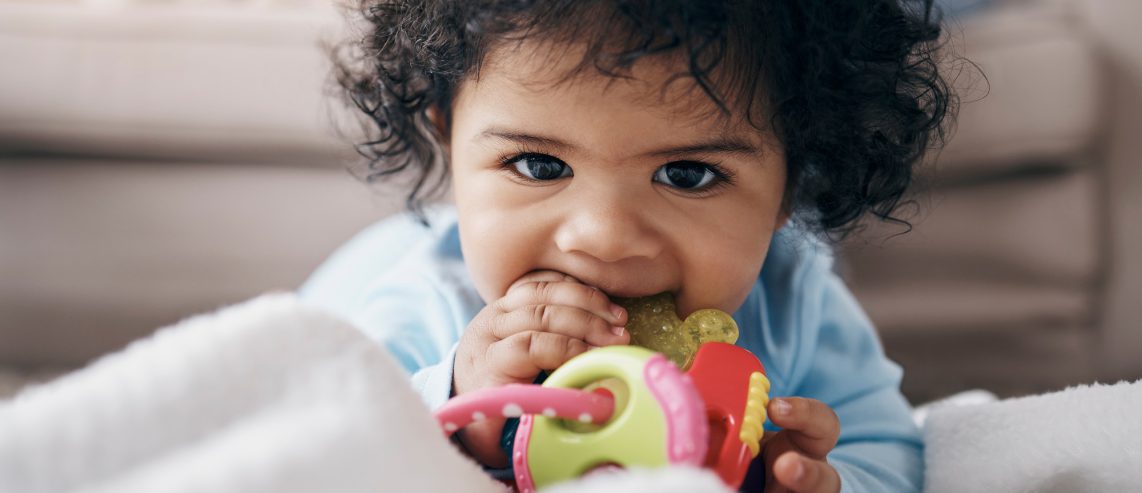If your baby is suddenly fussy, drooling, or rubbing her ears, they may be getting ready for a tooth to erupt. Tooth eruption (teething) happens when a growing tooth breaks through the gums.
While teething is normal, it can be uncomfortable for babies. Here’s what you need to know about tooth eruption and how to ease your baby’s discomfort.
When Do Baby Teeth Come In?
The timing of teething can vary. Some babies start getting primary teeth — also called their deciduous, baby, or milk teeth — at just a few months old. Others are still toothless at one year.
The stages of tooth eruption generally follow a specific pattern. Here is when your baby’s teeth will most likely come in — and in what order.
- Bottom central incisors (the bottom front teeth) at between 4 and 7 months.
- Top central incisors (the top front teeth) at between 6 and 8 months.
- Top lateral incisors (either side of top front teeth) at between 9 and 11 months.
- Bottom lateral incisors (either side of bottom front teeth) at between 10 and 12 months.
- First molars (back teeth on top and bottom) at between 12 and 16 months.
- Canines (teeth between the top and bottom lateral incisors and first molars) at between 16 and 20 months.
- Second molars (the furthest back on top and bottom) at between 20 and 30 months.
Almost all children will have a complete set of 20 baby teeth by the time they’re 2 to 3 years old. Permanent teeth start replacing the primary ones when your child is about six.
Never Miss a Beat!
Subscribe to Our HealthBeat Newsletter!
Thank you for subscribing!
You can now select the specific newsletters you'd like to receive.
You are already subscribed.
Subscribe to more newsletters in our email preference center.
Sorry, an error occurred. Please try again later.
Get Healthy Tips Sent to Your Phone!
Teething Symptoms
Most babies show clear signs of teething. Symptoms include:
- A desire to chew on things or put things in their mouth.
- A low fever (under 100.4 degrees).
- Disrupted eating and sleeping patterns.
- Ear-rubbing.
- Irritability.
- More drooling than usual.
- Rash on the cheeks or neck from drooling.
- Tender, red, swollen gums.
How to Ease Teething Pain
It’s hard to see your baby in discomfort. Fortunately, there are several ways to ease your child’s teething pain.
Do:
- Get a clean washcloth wet and freeze it for 30 minutes. Chewing on the cold washcloth can help reduce swollen and achy gums. Wash it after every use.
- Give your child a dose of baby acetaminophen (Tylenol) if your doctor okays it. Always check with your pediatrician before giving your child any medicine.
- Give your baby a teething ring made of firm rubber to chew on. Don’t use one that’s frozen or too hard, as it could hurt the baby’s gums.
- Wash your hands well and massage your baby’s gum with a finger. You can also use a cool, clean baby spoon for this task.
- Wipe excess drool from your baby’s face to help prevent rashes.
Don’t:
- Give your child teething biscuits if they’re not yet eating solid food. They could choke on them.
- Give your child teething jewelry. Bracelets, beads, or anything else that could choke or strangle your child. These items are often made of amber, wood, marble, or silicone.
- Give your child a gel-filled teether that could break open.
- Tie a teething ring around your baby’s neck. It is a strangulation hazard.
- Use homeopathic teething tablets. Some teething tablets contain ingredients from the plant poison belladonna.
- Use teething creams or gels that contain benzocaine. It can numb the back of your baby’s throat and make it hard for them to swallow.
Keeping Your Baby’s Teeth Healthy
Because baby teeth aren’t permanent, people don’t always realize the need for good dental hygiene. But it’s vital to start dental care early. Your baby can develop tooth decay and cavities as soon as they have teeth.
Cavities (holes in the teeth) form when bacteria in the mouth feed on sugar left over from food and drink. Even breast milk and formula can lead to cavities. The bacteria eat the sugars and create acids that degrade enamel, the smooth covering of the teeth.
Here are some reasons to take good care of your baby’s first teeth:
- Very young children need healthy teeth to speak clearly and chew their food. They will also feel more confident with healthy, clean teeth.
- If a baby’s tooth is missing, the other ones move to fill in the gaps. This shifting could cause your child’s permanent teeth to come in crooked. They may need expensive braces later.
- Getting a baby used to good dental hygiene early will help make cleaning their teeth a habit. They will take better care of their teeth as they age.
- Your dentist may need to pull a baby’s decayed teeth — a frightening prospect.
Taking care of your baby’s teeth is more than just a quick brush. For good dental hygiene for babies includes:
- Avoid sugary sodas and fruit juice for babies under 12 months old.
- Don’t use bottles to soothe your baby. Opt for a pacifier instead.
- Before your baby has teeth, wipe their gums with a clean, damp washcloth after meals. Your baby will get comfortable with the process of cleaning their teeth.
- Make brushing their teeth for two minutes part of their bedtime routine.
- Never put your baby to bed with a bottle. The liquid can pool in their mouth and lead to tooth decay.
- Never share utensils, cups, or straws, or put the baby’s pacifier in your mouth.
- Once your child has teeth, brush them with fluoride toothpaste the size of a grain of rice.
- Schedule a dentist visit for your baby by 12 months.
When to Call the Doctor
Teething symptoms are usually mild. If your baby isn’t feeling well or acting normally, they may be sick. Don’t mistake an actual illness for teething.
You should call the doctor if your baby:
- Doesn’t want to nurse or take a bottle.
- Has a fever of more than 100.4 degrees. A high fever could mean an infection.
- Has a rash on the arms, legs, or torso.
- Has a runny nose.
- Has diarrhea.
- Has seemed out of sorts for more than a few days.
- Is vomiting.
None of these symptoms are signs of teething but could be signs of another illness. When you have questions or concerns about teething, it’s always best to call your pediatrician for advice.
Editor's Note: This article was originally published on , and was last reviewed on .
Sources
Kidshealth.org, Teething Tots, Link
American Academy of Pediatrics, Baby Teething Pain, Link
American Academy of Pediatrics, Baby's First Tooth: 7 Facts Parents Should Know, Link
American Academy of Pediatrics, Why It's Important to Take Care of Baby Teeth, Link
FDA, Safely Soothing Teething Pain and Sensory Needs in Babies and Older Children, Link
FDA, FDA confirms elevated levels of belladonna in certain homeopathic teething products, Link
NHS, Baby Teething Symptoms, Link
American Dental Association, Teething, Link
About Pediatrics
From nutrition to illnesses, from athletics to school, children will face many challenges growing up. Parents often will make important health care decisions for them. We hope to help guide both of you in that journey. UPMC Children’s Hospital of Pittsburgh is a national leader in pediatric care, ranking consistently on U.S. News & World Report’s Best Children’s Hospitals Honor Roll. We provide expert treatment for pediatric diseases, along well-child visits, urgent care, and more. With locations across Pennsylvania, Maryland, and West Virginia, you can find world-class care close to home. We also work closely with UPMC Magee-Womens Hospital, a national leader in care for newborns and their mothers. Our goal is to provide the best care for your children, from birth to adulthood and beyond. Visit our website to find a doctor near you.

